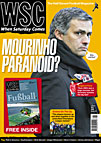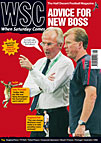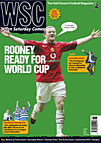
Dear WSC
The Spurs “yids” thing (WSC 230) is indeed well and truly weird. This derogatory term emanated from Arsenal, a club with a proud tradition of support from the large north London Jewish community. As an eight- or nine-year-old, sitting high in the Highbury east stand with my uncle at my first ever game, even my pre-pubescent jewdar was sufficiently sensitive to know I was among my own. These days it’s a London thing. The term is seldom heard from northern fans, whereas one Chelsea fan website, presumably popular as it is on Google’s first page, proudly lists the lyrics to more than 25 (I stopped counting) anti-Semitic songs. In the mid-1970s, some Spurs fans created an incomprehensibly bizarre variant on terrace youth sub-culture by wearing skinhead uniform, skullcaps and Israeli flags. There’s one for all the sociologists out there. I sit in a different east stand now and for years optimistically clung to the notion that, in reclaiming the word, Spurs fans displayed rudimentary class consciousness and solidarity with discriminated groups in our society. This forlorn hope has been shattered in the face of vicious, sustained homophobic chanting, ostensibly related to Sol Campbell’s predicaments. The lip service paid by most clubs to kick out racism seems positively enlightened by comparison, and if we can’t learn anything from all this then the future’s bleak for football.
Alan Fisher, Tonbridge
Read more…
 As well as England, there were 31 other teams in Germany, though there were times when the broadcasters struggled with the idea. Taylor Parkes looks at the relentless melange of jingoism and ignorance from Clive, Peter, Garth, Ian and friends
As well as England, there were 31 other teams in Germany, though there were times when the broadcasters struggled with the idea. Taylor Parkes looks at the relentless melange of jingoism and ignorance from Clive, Peter, Garth, Ian and friends
